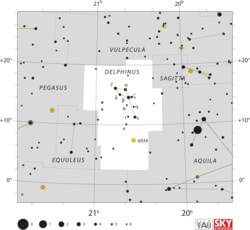Astronomy:Delta Delphini
| Observation data Equinox J2000.0]] (ICRS) | |
|---|---|
| Constellation | Delphinus |
| Right ascension | 20h 43m 27.53338s[1] |
| Declination | +15° 04′ 28.4773″[1] |
| Apparent magnitude (V) | 4.43[2] (4.38 - 4.49)[3] |
| Characteristics | |
| Spectral type | kA7hF1VmF1pSrEuCr:[4] |
| B−V color index | +0.302[2] |
| Variable type | δ Sct[3] |
| Astrometry | |
| Radial velocity (Rv) | 9.48±0.07[5] km/s |
| Proper motion (μ) | RA: −20.44[1] mas/yr Dec.: −43.33[1] mas/yr |
| Parallax (π) | 14.61 ± 0.20[1] mas |
| Distance | 223 ± 3 ly (68.4 ± 0.9 pc) |
| Absolute magnitude (MV) | +0.25[6] |
| Orbit[5] | |
| Period (P) | 40.60505±0.00014 d |
| Semi-major axis (a) | 5.4676±0.0037 |
| Eccentricity (e) | 0.64008±0.00018 |
| Inclination (i) | 13.92±0.18° |
| Longitude of the node (Ω) | 63.73±0.33° |
| Periastron epoch (T) | 56823.5019±0.0028 MJD |
| Argument of periastron (ω) (secondary) | 65.07±0.32° |
| Semi-amplitude (K1) (primary) | 13.88±0.14 km/s |
| Semi-amplitude (K2) (secondary) | 15.27±0.07 km/s |
| Details | |
| δ Del A | |
| Mass | 1.78[5] M☉ |
| Radius | 3.43[5] R☉ |
| Luminosity | 32.4[5] L☉ |
| Surface gravity (log g) | 3.71[7] cgs |
| Temperature | 7,440±210[5] K |
| Metallicity [Fe/H] | −0.5[5] dex |
| Rotational velocity (v sin i) | 17[5] km/s |
| Age | 945[7] Myr |
| δ Del B | |
| Mass | 1.62[5] M☉ |
| Radius | 3.48[5] R☉ |
| Luminosity | 28.8[5] L☉ |
| Temperature | 7,110±180[5] K |
| Rotational velocity (v sin i) | 12[5] km/s |
| Other designations | |
| Database references | |
| SIMBAD | data |
Delta Delphini, Latinized from δ Delphini, is a binary star[9] in the northern constellation of Delphinus. It is visible to the naked eye with an apparent visual magnitude of 4.43.[2] Based upon an annual parallax shift of 14.61 mas as seen from the Earth,[1] the system is located about 223 light years from the Sun.
This is a double-lined spectroscopic binary[9] system with an orbital period of 40.58 days.[9] The two components are nearly identical chemically peculiar stars, having a combined stellar classification of kA7hF1VmF1pSrEuCr:. This notation indicates the calcium K line matches an A7 star, the hydrogen lines an F1 star, and the metal lines an F1 star, with particularly strong lines of strontium, europium, and chromium. Each of the stars is a Delta Scuti variable, with the system having a dominant period of 0.1568 days and an amplitude of 0.0700 in magnitude.[2] Delta Delphini forms the prototype of a class of metal-lined δ Scuti subgiant or giant stars.[11]
References
- ↑ 1.0 1.1 1.2 1.3 1.4 1.5 van Leeuwen, F. (2007), "Validation of the new Hipparcos reduction", Astronomy and Astrophysics 474 (2): 653–664, doi:10.1051/0004-6361:20078357, Bibcode: 2007A&A...474..653V.
- ↑ 2.0 2.1 2.2 2.3 Chang, S.-W. et al. (2013), "Statistical Properties of Galactic δ Scuti Stars: Revisited", The Astronomical Journal 145 (5): 132, doi:10.1088/0004-6256/145/5/132, Bibcode: 2013AJ....145..132C.
- ↑ 3.0 3.1 Samus, N. N. et al. (2009), "VizieR Online Data Catalog: General Catalogue of Variable Stars (Samus+ 2007-2013)", VizieR On-line Data Catalog: B/GCVS. Originally Published in: 2009yCat....102025S 1, Bibcode: 2009yCat....102025S.
- ↑ Gray, R. O.; Napier, M. G.; Winkler, L. I. (April 2001), "The Physical Basis of Luminosity Classification in the Late A-, F-, and Early G-Type Stars. I. Precise Spectral Types for 372 Stars", The Astronomical Journal 121 (4): 2148–2158, doi:10.1086/319956, Bibcode: 2001AJ....121.2148G.
- ↑ 5.00 5.01 5.02 5.03 5.04 5.05 5.06 5.07 5.08 5.09 5.10 5.11 5.12 Gardner, Tyler et al. (2018), "Precision Orbit of δ Delphini and Prospects for Astrometric Detection of Exoplanets", The Astrophysical Journal 855 (1): 1, doi:10.3847/1538-4357/aaac80, Bibcode: 2018ApJ...855....1G.
- ↑ Anderson, E.; Francis, Ch. (2012), "XHIP: An extended hipparcos compilation", Astronomy Letters 38 (5): 331, doi:10.1134/S1063773712050015, Bibcode: 2012AstL...38..331A.
- ↑ 7.0 7.1 David, Trevor J.; Hillenbrand, Lynne A. (2015), "The Ages of Early-Type Stars: Strömgren Photometric Methods Calibrated, Validated, Tested, and Applied to Hosts and Prospective Hosts of Directly Imaged Exoplanets", The Astrophysical Journal 804 (2): 146, doi:10.1088/0004-637X/804/2/146, Bibcode: 2015ApJ...804..146D.
- ↑ "del Del". SIMBAD. Centre de données astronomiques de Strasbourg. http://simbad.u-strasbg.fr/simbad/sim-basic?Ident=del+Del.
- ↑ 9.0 9.1 9.2 Liakos, Alexios; Niarchos, Panagiotis (February 2017), "Catalogue and properties of δ Scuti stars in binaries", Monthly Notices of the Royal Astronomical Society 465 (1): 1181–1200, doi:10.1093/mnras/stw2756, Bibcode: 2017MNRAS.465.1181L.
- ↑ Light Curve, ESA, https://www.cosmos.esa.int/web/hipparcos/java-tools/light-curve, retrieved 31 August 2022.
- ↑ Baade, D.; Bardelli, S.; Beaulieu, J. Ph.; Vogel, S. (March 1993), "A spectroscopic search for nonradial pulsations in the Delta Scuti stars Delta Delphini and Epsilon Cephei", Astronomy and Astrophysics 269 (1–2): 195–200, Bibcode: 1993A&A...269..195B.
External links
- Kaler, James B. (August 3, 2007), "Delta Delphini", Stars (University of Illinois), http://stars.astro.illinois.edu/sow/deltadel.html, retrieved 2017-06-28.
 |



